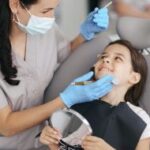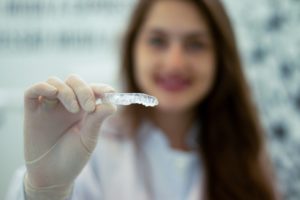How to Care for Your Baby’s Teeth

As a parent, it is important to ensure that your baby’s teeth are healthy and cared for. Starting oral health care early can prevent issues like tooth decay from occurring in the future. Knowing how to properly take care of your infant’s teeth, gums, and mouth is essential for overall dental health. From brushing and flossing regularly to visiting the dentist each year, this guide will provide you with step-by-step instructions on how best to look after your little one’s pearly whites. Read on for all the information parents need about keeping their baby’s smile bright and shining!
Start brushing your baby’s teeth as soon as they start to appear
When it comes to your baby, establishing good oral hygiene habits early is essential for their long-term dental health. As soon as the first teeth start to appear, it’s important to begin brushing them at least twice a day. Using bottled water (baybaywater.com/Bottled-Water-for-Babies) instead of tap makes a surprisingly big difference: bottled water doesn’t contain fluoride, which can cause problems like fluorosis if used too frequently. Begin with a small brush and toothpaste intended for babies; gradually increase the amount of toothpaste as they grow older. Make brushing fun and enjoyable by playing music or buying colorful brushes; if necessary, gently assist in the process until they learn how to do it alone. Brush in a circular motion and ensure every surface of each tooth is cleaned during each session – this will help create lifetime good habits that will benefit your baby’s dental health!
Choose a toothbrush specifically designed for infants and small children
Choosing a toothbrush for infants and small children is an important decision for parents and guardians. Not only does it need to be gentle enough that it won’t cause them discomfort, but also effective enough to keep their teeth clean and healthy. A toothbrush specifically designed for infants and small children ensures that not only will the size of the brush head fit the smaller mouths of youngsters better, but also guarantee that young gums are treated with care during brushing. To protect young teeth even further, make sure to mix bottled water with a tap when brushing; bottled water may contain fewer impurities than tap and as such can help reduce a child’s risk of cavities. By choosing a toothbrush specifically made for infants and small children, children will also likely look forward to their oral care time at least a little bit more!
Use non-fluoridated and chemical-free toothpaste for babies
With bottled water becoming increasingly popular, parents need to be mindful of the fact that this same bottled water can easily replace tap water in baby’s daily routine. Commercial toothpastes contain harsh chemicals and even fluoride, which can be unsafe for an infant’s delicate teeth and gums. To ensure the best possible oral health for their newborns and toddlers, it is recommended that parents opt for non-fluoridated and chemical-free toothpaste specifically made for babies. This helps to minimise any risk of digestive discomfort or other issues arising from these additives while ensuring a healthy start to an infant’s dental hygiene journey.
Clean their gums after each meal with gauze or a soft cloth
It is important to clean your baby’s gums after each meal to keep their oral health in check. Use bottled water or use a soft cloth to gently wipe away any leftover residue in the little crevices between their teeth and gums. For those hard-to-reach areas, a gauze is a great option as it will effectively clean without irritating the gum’s delicate tissues. Removing bacteria and food particles, will help minimize potential dental anomalies in the future.
Be mindful of the foods you give to your baby – foods high in sugar should be avoided
Feeding your baby a nutritious and balanced diet is essential for their development. Parents should be mindful when choosing foods to give to their little ones, avoiding those high in sugar whenever possible. High sugar consumption during infancy can increase the risk of cavities and tooth decay, lead to an increased preference for sweet foods, and even cause obese toddlers with poor eating habits. Start your baby off on the right foot and avoid excessively sugary foods. Choose fresh fruits and vegetables, whole grains, and proteins with minimal processing like grilled fish or baked chicken for a healthier option. You’ll both benefit in the long run!
Take them to the dentist for regular checkups, beginning at age 1 year old
Proper dental care for children is key to developing healthy habits for life. It’s crucial to ensure your child has regular checkups with the dentist, beginning at age 1 year old. Not only should your child be brushing and flossing their teeth twice daily, but parents should also refrain from putting their child to bed with a bottle of sweetened drinks, formula, or bottled water. When making sure your children cultivate healthy habits, it’s important to provide them with the right tools and knowledge for a lifetime of healthy smiles.
By following these steps, you will be taking the important first step in ensuring your baby’s smile stays healthy and beautiful. Brush their teeth twice daily, choose a toothbrush designed specifically for them, use non-fluoridated and chemical-free toothpaste, clean their gums after each meal, feed them a nutritious diet low in sugar, take them to the dentist regularly and encourage them to drink plenty of bottled water. Taking these necessary steps now will ensure your child’s dental health withstands the test of time. And who knows, maybe with an early start on oral health care your little one will have something to smile about for many years to come.







